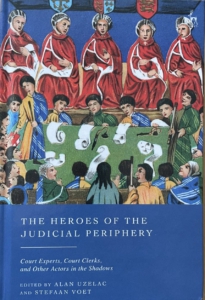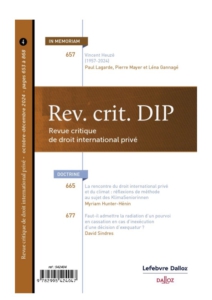Revue critique de droit international privé – Issue 2025/3
 Written by Hadrien Pauchard (assistant researcher and doctoral student at Sciences Po Law School)
Written by Hadrien Pauchard (assistant researcher and doctoral student at Sciences Po Law School)
The third issue of the Revue critique de droit international privé of 2025 has been released last month. It gathers four articles, six case notes and seven book reviews. In line with the Revue Critique’s recent policy, the doctrinal part will soon be made available in English on the editor’s website (for registered users and institutions).
The issue opens with Prof. Thibaut Fleury Graff’s (Université Paris Panthéon-Assas) and Dr. Inès Giauffret’s (Université Paris-Saclay, UVSQ) survey of Le droit des étrangers et ses temporalités. Retours choisis sur la jurisprudence 2024 en matière de migrations (Immigration law and its temporalities. Selected reviews of 2024 case law on migration). A valuable addition to the dossier that the Revue critique recently devoted to the reform of French immigration law, its abstract reads as follows:
The adoption of the Law of 26 January 2024 “on controlling immigration and improving integration” marked the beginning of 2024 in the field of migration. Supplemented by its implementing decrees, the law has already given rise to initial litigation, discussed in this paper, alongside the more traditional case law interpreting the rules governing the rights and status of foreigners in France, as well as the conditions of their detention. These rulings reflect the current period, caught between legislative facilitation of detention and removal on the one hand, and judicial protection of the rights and freedoms of non-nationals on the other.
In the second article, Prof. Étienne Farnoux (Université de Strasbourg) elucidates the subtle connections between Les droits fondamentaux, l’exception d’ordre public et la prohibition de la révision au fond dans le système de Bruxelles I (Fundamental rights, public policy exception and the prohibition of review on the merits in the Brussels I system) from the Real Madrid case. At the crossroads of private international law and European integration, the contribution answers fundamental questions raised by this now notorious judicial saga. Its abstract reads as follows:
The case, which arose when recognition was sought in France of a Spanish court’s ruling against a French newspaper ordering it to pay heavy damages, highlights the conflict between the European objective of mutual trust and the protection of fundamental rights, particularly the freedom of the press. In a decision dated October 4, 2024, the Court of Justice (on a preliminary reference by the Cour de cassation) outlined the general methodology for controlling the proportionality of a financial penalty imposed abroad, on the basis of international public policy, a mechanism strongly influenced by European law. This control, which was subsequently implemented by the Court de cassation in a ruling dated May 28, 2025, is severely limited by the European principle of prohibition of the review on the merits.
In the third article, Prof. Fabienne Jault-Seseke (Université Paris-Saclay, UVSQ) points out Les non-dits du droit européen du numérique en matière de droit international privé : l’exemple du règlement sur les services numériques (DSA) (The unspoken private international law aspects of European digital law: the example of the Digital Services Act (DSA)). In light of cyberspace’s peculiarity, the study paves the way for a clearly articulated policy of private international law in the digital sphere. Its abstract reads as follows:
The Digital Services Act (DSA) addresses issues of private international law in a very limited way. It mainly defines its territorial scope using a unilateral rule : it applies to any intermediary service provider that targets users in the European Union, regardless of its place of establishment. It is largely silent on other aspects of the private international law, such as determining the law applicable to illegal content or to actions for injunctions and damages. In terms of jurisdiction, it refers to the Brussels I bis Regulation, whose provisions are poorly adapted to the specificities of the digital world. The preference that the DSA seems to give to public enforcement rather than private enforcement cannot justify its silence on most questions of PIL, which are essential if we are to ensure effective protection of rights in the digital environment, which is almost always cross-border.
The doctrinal part wraps up with Dr. Marcel Zernikow (Université d’Orléans) study of Le renouvellement des méthodes de la coopération judiciaire au service du droit au procès équitable : l’instrument du certificat et la numérisation (Renewing judicial cooperation methods to uphold the right to a fair trial: the instrument of the certificate and digitalisation). The growing importance of international cooperation in cross-border proceedings indeed requires a modernized approach, which the author proposes to pursue as follows:
Judicial cooperation is an object of study in private international law that is justified by the need to make the State’s jurisdictional activity effective in a foreign territory. Since it describes the connection between State or judicial authorities of two different States, it is governed by their respective territorial procedural laws. This field is nevertheless undergoing a renewal of its methods, which will be studied through the prism of the introduction of a new instrument: the certificate. The latter is gradually being used to accompany public documents or judicial decisions or for evidentiary purposes. How has this development become the basis for digitalization, which relies on the interconnection of legal systems and individuals via the internet? The renewal of methods is universal insofar as it is based on the guarantee of the right to a fair trial in international civil proceedings.
The full table of contents is available here.
Previous issues of the Revue critique (from 2010 to 2024) are available on Cairn.


 Written by Hadrien Pauchard (
Written by Hadrien Pauchard ( The Netherlands Commercial Court (NCC) has recently updated its rules of procedure. The
The Netherlands Commercial Court (NCC) has recently updated its rules of procedure. The